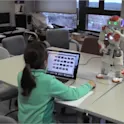
Health
24 Feb 2017
Fighting malnutrition with education
Improving the academic training of healthcare professionals in human nutrition is necessary to fight malnutrition

Health
24 Feb 2017
Improving the academic training of healthcare professionals in human nutrition is necessary to fight malnutrition

Frontiers news
30 Jan 2017
Assessment, Testing and Applied Measurement is the new specialty section in Frontiers in Education, led by Professor Gavin Brown

Psychology
08 Dec 2016
Study shows learning strategies are key to academic achievement and describe behavioural interventions that could reverse underachievement – By Abigail Pattenden, Science Writer – Not all children do well in school, despite being intellectually capable. Whilst parental relationships, motivation and self-concept all have a role to play, a recent study published in the journal Frontiers in Psychology shows that children’s learning strategy is key for academic success. The study showed that students with normal scores on intellectual tests but that have poor grades in secondary school are also not as good at acquiring and retaining information, or later applying it. Lead researcher of the study and professor at the University of Alicante in Spain, Juan Castejón, concludes that underachieving students appear to employ all of the learning strategies considered, but to a lesser extent than normal and overachieving students, and this seems to be the key for academic success. “The underachievers group of students also has poorer attitudes to learning goals, poorer relationships with their parents, and lower emotional stability than their peers,” says Castejón, “but learning strategies showed the strongest relationship with achievement.” By comparing underachievers with normal- or over-achievers, the work brings new insight on how educational interventions […]

Neuroscience
04 Nov 2016
By Ian Salter, Frontiers Science Writer The use of robotic tutors in primary school classrooms is one step closer according to research recently published in the open access journal Frontiers in Computational Neuroscience. Dr Imbernòn Cuadrado and his co-workers at the Department of Artificial Intelligence in Madrid have developed an integrated computational architecture (ARTIE) for use with software applications in schools. “The main goal of our work was to design a system that can detect the emotional state of primary school children interacting with educational software and make pedagogic interventions with a robot tutor that can ultimately improve the learning experience,” says Luis Imbernòn Cuadrado. Online educational resources are becoming increasingly common in the classroom, although they have not taken into sufficient account that the learning ability of primary school children is particularly sensitive to their emotional state. This is perhaps where robot tutors can step in to assist teachers. Rather than focusing on specific emotions, the researchers first identified three cognitive states (concentrating, distracted and inactive) known to influence the course of learning. Keyboard strokes and mouse actions of children using educational software were used to predict which of these cognitive states the child is experiencing and subsequently linked […]

Young Minds
23 Aug 2016
Frontiers for Young Minds is growing and we are celebrating the first two papers in our youngest Specialty Section Understanding Health. This new specialty is led by our Specialty Chief Editors, Fulvio D’Acquisto and Jay Giedd. Read the Articles Learn about how Nanotechnology could be the next way to treat cancer by providing an alternative delivery system that is so tiny, yet could be the next solution in targeting cancer cells (Author: Dr. Courtney Thomas). Read full article. Come and explore what a Biofilm is including how they are formed and how we can try to beat them to treat infections (Authors: Drs. Mira Okshevsky and Rikke Louise Meyer). Read the full article. You can look forward to more articles in this exciting new specialty coming soon. Find Out More More information about participating in Frontiers for Young Minds can be found here. Frontiers for Young Minds is currently accepting submissions in four specialties: Understanding Health Understanding Neuroscience Understanding the Earth and its Resources Understanding Astronomy and Space Science Researchers interested in submitting Frontiers for Young Minds versions of their work can find more information here. Please contact kids@frontiersin.org for any additional questions.

Life sciences
27 Apr 2016
By Tania FitzGeorge-Balfour, Frontiers science writer In recent years there has been an explosion in the number of smartphone apps aimed at ‘brain training’. These games often make confident statements about improving our mental performance, but there is little scientific evidence to show that they do. A new study in the open-access journal Frontiers in Human Neuroscience has investigated why consumers decide to download these apps, how they use them and what they think their benefits may be. “While the evidence of the effectiveness of brain training remains controversial, our results suggest that the public is interested in learning more about the actual science behind the claims made by the app developers,”says Dr. John Torous, a clinical psychiatrist at the Beth Israel Deaconess Medical Center, Boston, lead author of the study. Young people and those with internet access tend to have high rates of smartphone ownership, so Dr. Torous and his co-authors designed a survey targeted at this group. They asked participants about their thoughts, use and experience of brain-training apps. Over three thousand people responded, making this the largest internet survey to date asking consumers about these apps; the results were insightful. Over two thirds of those that responded […]

Life sciences
11 Jun 2015
The study used data from 4,450 US adolescents to probe why some students shun math-intensive fields. Believing that solving tough math problems requires innate abilities might discourage students, the researchers reasoned.
Get the latest research updates, subscribe to our newsletter